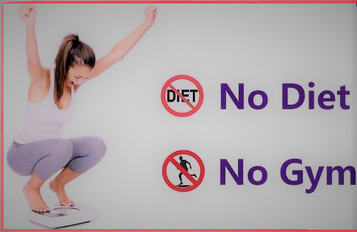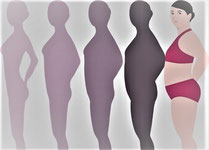
Losing weight by sticking to a conventional diet and/or exercise plan can be tricky and take quite a long time.
The good news is that there are a few tips that can really help you through this complicated weight loss process as well as keep you away from gaining weight in the future.
The ways to lose weight without diet and/or exercise
- 1- Eat smaller portions: Typical food portions are larger today than it was a few decades ago. This trend has been associated to weight gain in western counties. Smaller portions can help you to eat less. The size of the plate might affect your decision to choose bigger portions so it is better to opt for smaller plates as a bigger plate can make a serving look smaller, which may affect your decision to add more food to the plate. A good strategy is to serve healthy food on bigger plates and unhealthy food, such as processed food, on smaller plates.
- 2- Eat slowly: Your brain needs time to process all the food you have eaten. Eating slowly has been shown to be related to decreased food intake while increasing fullness. Studies show that fast eaters are more likely to gain weight than slow eaters. Fast eaters are also more prone to be obese.
- 3-Drink more water: Drinking water can help you eat less, thus helping weight loss. This is especially true if you drink water before your meal. Studies show that drinking 1/2 litre of water approx. 30 minutes before your meals can reduce hunger and calorie intake. People who usually drank water before their meals lost on average 44% more weight compared to those who did not typically drink water before meals. Any low-calorie drink can substitute water if you prefer to drink liquids with a taste.
- 4- Eat more proteins and fiber: Proteins affect the appetite, increasing the feelings of fullness, reducing hunger and helping you to eat less calories. Studies show that increasing the protein intake from 15% - 30% can help people to eat less calories per day, boosting the weight loss process, and without the need of restricting any foods. A few examples of protein-enriched foods include: chicken breasts, fish, yoghurt, lentils, quinoa and almonds. Eating fiber-enriched foods can also help you to increase satiety, making you feel full for longer, and reducing food intake. Examples of healthy fibers include: beans, cereals, asparagus, oranges and seeds.
- 5- Keep the unhealthy foods far away: Storing unhealthy foods near you may increase your feeling of hunger and cravings, unconsciously making you to eat more and causing weight gain. Studies show that if high-calorie foods are more visible, people are more likely to gain more weight than those people who only keep fruits or veggies visible. Keeping healthy foods visible can help you to always make more healthy choices.
- 6- Say no to sugar drinks: Sugar-enriched drinks is one of the most dangerous drinks today. Sugary drinks like soda or coca-cola have been related to an increased likelihood of many diseases. It is truly easy to consume tons of extra calories from sugar-rich drinks because the calories present in the drinks do not typically affect the feeling of fullness compared to solid foods. Consistently not drinking these type of beverages can truly provide long-term health benefits. While doing so, remember not to replace sugar-rich drinks with processed fruit juices, as these can be very high in sugar as well. Healthy alternative drinks include: water, coffee, and green tea.
- 7- Sleep well: Sleep can have a very powerful effect on appetite and weight. Lack of sleep may disrupt the appetite hormones, thus increasing your hunger and cravings for unhealthy food, which in turn may lead to higher calorie intake. Furthermore, long-term sleep deprivation may increase the risk of several diseases, such as: type 2 diabetes and obesity.
- 8- Control your stress: Similar to sleeping, stress can powerfully affect your appetite and weight. The hormone cortisol can increase if you are stressed, increasing your feeling of hunger and cravings for unhealthy food, thus causing higher calorie intake and weight gain. Furthermore, chronic stress may also increase the risk of certain diseases.
- 9- Silence your devices: If you pay more attention to what you eat it may help you consume less calories. People who usually eat while they are watching TV or playing with their mobile phones can lose track of how much they are eating, which can make you eat more. Studies show that people who are distracted while eating can eat approx. 10% more than non-distracted people. Furthermore, distracted people typically can eat till 25% more calories at later meals during the day than those conscious eaters. Extra calories really add up and can truly impact your weight in the long run.
Take home message
Simple lifestyle habits can make a huge difference for those people seriously intending to lose weight. Most effective tricks normally have nothing to do with dieting or exercise choices. Simple tricks like: use smaller portions/plates, eating slowly, drinking non-sugary drinks or not eating in front of the TV or computer can truly make a huge difference. Prioritizing foods rich in protein and fiber can also have a great impact.
While introducing new habits into your daily routines it is probably better to practice one after another, not to try all the tips at once. It is better to practice one new tip at a time and for a while, and if the tip works well for you then try the next one. Simple changes like the ones above can truly have a massive impact on your weight loss/maintenance plan over the long run.
First Edition: Nov 2021







Write a comment